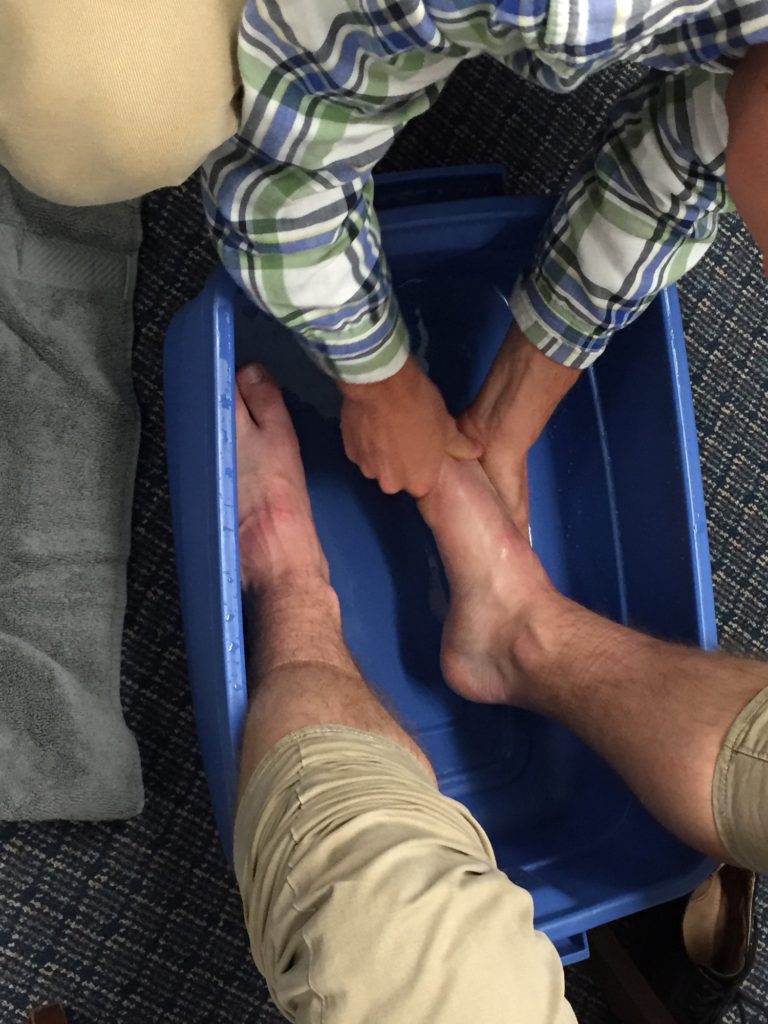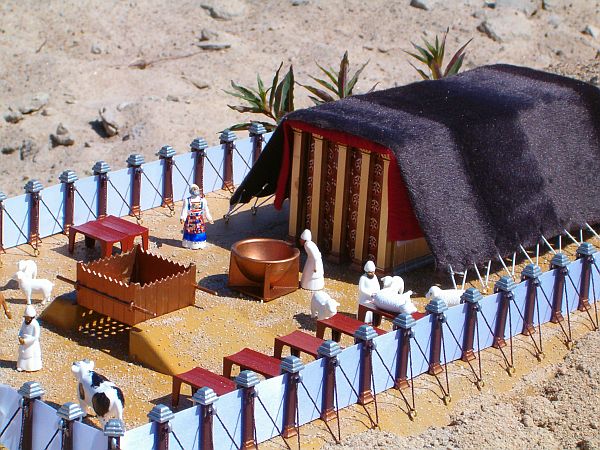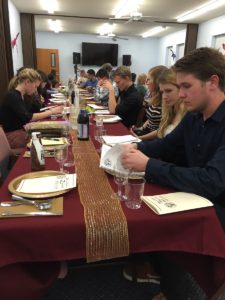
https://hoshanarabbah.org/blog/?s=biblical+dietary+laws&submit=Search


What is the chief attribute of Yehovah Elohim? It is holiness, for this is what Scripture revealed that the spirit beings in his heavenly throne room are chanting day and night.
In the year that King Uzziah died, I saw the Lord sitting on a throne, high and lifted up, and the train of His robe filled the temple. Above it stood seraphim; each one had six wings: with two he covered his face, with two he covered his feet, and with two he flew. And one cried to another and said: “Holy, holy, holy is the YHVH of hosts; The whole earth is full of His glory!” (Isa 6:1–3)
The four living creatures, each having six wings, were full of eyes around and within. And they do not rest day or night, saying: “Holy, holy, holy, YHVH Elohim Almighty, Who was and is and is to come!” (Rev 4:8)
What is holiness? The Bible defines it is as those things, people, times and practices that YHVH himself has determined are to be set apart or are above or are transcendent. Set apart from or transcendent above what? From those things that are mundane or earthly, defiled or polluted by sin or by that which is unholy and ungodly.
Why is it important to know that the chief character attribute of Elohim is holiness? Because he wants his children to be holy as he is holy (Lev 11:44, 45). Why is this? Because he wants to spend eternity with his redeemed and glorified children, for without holiness no one will see Elohim (Heb 12:14). It’s really that simple! Therefore, it’s important that his children learn now the difference between what YHVH considers to be the holy and the profane (Lev 11:47), so we can hang out with him in his holy presence for eternity.
Natan’s Commentary Notes on Leviticus Chapter Eleven
Leviticus 11:1–47, The biblical dietary laws are about holiness.
Let’s briefly discuss the subject of clean and unclean meats. The focal point of biblical dietary laws are holiness and separation. There are other issues here that need to be explored as well. How serious are you about obedience to YHVH’s commands, or is your belly your god? (See Phil 3:19; Rom 16:18.) Do your taste buds or the Word of YHVH rule your life? Remember, Torah covers all aspects of life: physical, spiritual, emotional, relational, civil, agricultural, political, jurisprudence, religious and economic. Torah is a very holistic handbook on life. Are you one who takes the (humanistic) pick-and-choose approach to Torah-obedience? “I’ll obey only the biblical laws that suit me.” Such an approach is akin to what the serpent told Adam and Eve when he said, “You can have it your way … YHVH didn’t really mean what he said when it comes to obedience.”
When most people think of word kosher, the biblical dietary laws come to mind. This is only part of the picture that the Bible presents when it comes to the subject of kashrut. The biblical kosher laws involve not only clean and unclean meats, but many other areas as well such as health issues, holiness (not defiling the body, the temple of YHVH’s Set-Apart Spirit), and separation issues—how we’re to act, live, eat, worship, think, dress and talk differently than the heathens around us. The word kosher derives from the Hebrew word kasher/RAF meaning “to be straight, right, acceptable” (see Est 8:5; Eccl 11:6; 10:10). YHVH has called his people out of this world and sanctified (set-apart) them to be “straight, right and acceptable” to him. Therefore, YHVH hasn’t give us the liberty to act, speak, dress, eat and live the way the heathens do. He has called us to a higher moral and spiritual standard. We can’t expect to be called the children of the Most High, and still live like the children of the world. We must choose whom we are going to serve (see Josh 24:15): YHVH or mammon and this world (Matt 6:24).
Leviticus 11:4, 47, Unclean.The word unclean is the Hebrew word tameh meaning “defiled, impure, polluted ethically, ritually or religiously” and the word clean is the Hebrew word tahor meaning “pure physically, ceremonially, morally, ethically.” In verse 43, YHVH says that in eating unclean meats one becomes abominable (or detestable, filthy). In Ezekiel 22:26, YHVH rebukes his people because, “Her priests have violated my Torah-law, and have profaned my set-apart [Heb. kadosh] things: they have put no difference between the set-apart and profane, polluted or common, neither have they shown difference between the unclean and the clean, and have hid their eyes from my sabbaths, and I am profaned among them.” In Leviticus 11:45, the Torah states, “For I am YHVH that brought you up out of the land of Egypt, to be your Elohim. You shall therefore be set apart, for I am set apart/holy.”
Continue reading
Leviticus Chapter Nine Insights
Leviticus 9:1, 9, 15, 18, Take for yourself…sons of Aaron…the people’s offering. Redemption (along with obedience to YHVH’s commands leading to righteousness and holiness) starts with the individual (Aaron the high priest)—especially the head or priest of the home (the husband or father) and then ripples out to the immediate family (“the sons of Aaron”) and then spreads to those around us (“the people”).
Leviticus 9:2–4, YHVH will appear. It is impossible to appear before YHVH Elohim without the shedding of innocent blood for the atonement of man’s sins. Man is too sinful and unholy to be able to come before his perfect and holy Creator. The sooner human’s realize their sinfulness and unworthiness, and the need to deal with the sorry state their live is in, the sooner they will be able to fill their inner (some say the “God-shaped) void and the unmet need of having an intimate relationship with their Creator.
Leviticus 9:6, This is the thing. When atonement for sin is made, and a person comes to their Creator on that basis, YHVH and his glory will appear in one way or another in that person’s life.
Leviticus 9:6, 23, The glory [kobowd] of YHVH. Kobowd means “glory, honour, glorious, abundance, riches, splendour, dignity, reputation, reverence.” The root word of kobowd is the verb kabad or kabed meaning “to be heavy, be weighty, be grievous, be hard, be rich, be honourable, be glorious, be burdensome and be honoured.” According to The TWOT, the literal meaning of kabad/kabed is rarely used in Scripture; rather, its figurative meaning (e.g. to be heavy with sin) is more commonly used. As such, in Scripture it often refers to a weighty, impressive or prominent person in society who is worthy of honor and respect.
Continue reading
John 13:8, You will never wash. Peter rejected Yeshua’s washing his feet not because of human obstinateness, but because of his honor for Yeshua. Washing the feet of one’s guests was an act of hospitality on the part of a host and was usually performed by a servant, not the host. Peter considered it to be demeaning for the Master to be performing the task of a servant, yet this is exactly what Yeshua was attempting to demonstrate. As the Messiah, he came to lay down his life in loving service for his disciples and not to be served (Matt 20:28; John 10:15; 15:13). Yeshua then made the point that his disciples should following his example in serving one another (vv. 12–17).
John 13:14–15, You also ought to wash. Yeshua is giving a simple and clear command here for the saints to wash one another’s feet. How many Christian churches who claim to be followers and imitators of Yeshua actually wash each others’ feet? If Christian leaders in most churches are teaching their people to obey this command, now many other of Yeshua’s other commandments are they not teaching and obeying?
John 13:35, By this all will know. Love was to be the identifying mark of a disciple of Yeshua. The Bible defines love in several ways. We love Yeshua by keeping his (Torah) commands (John 14:15; 1 John 5:1–3). Yeshua defines the Torah as loving Elohim with all of our heart, soul mind and strength and loving our neighbor as ourself (Mark 12:28–31). Paul says that all the laws of Elohim can be summed up in love (Rom 13:8–10). Yeshua said that the greatest expression of love is to lay one’s life down for another as Yeshua did for us (1 John 3:16; 4:11). Without love, all the good—even religious works—we may do YHVH counts as nothing (1 Cor 13).
It’s important to note that most disciples of Yeshua (including Christians) believe this principle, but, sadly, when it comes down to reality, many fail to live out the identifying principles of love. How easy it is to view our religious works as the main identifying marks of our relationship with Yeshua. We may pride ourselves in the fact that we keep the Sabbath or the biblical holidays, practice full water baptism, speak in tongues, believe in the baptism of the Holy Spirit, practice the gifts of the Spirit, identify ourselves with the teachings of notable religious leaders, are Torah-obedient, eat or don’t eat certain types of foods, or other external practices and identifying marks. In truth, Yeshua looks less at these than the heart condition of the disciple. Does one have a heart of love, and is he obeying his Master and his neighbor as himself out of love to the best of his ability according to the light of the truth he has been given? This is the most important issue.
It’s interesting to note what Yeshua didn’t say in this verse. He didn’t say that all men will know that you’re my disciples because you have the right Bible version, pronounce the name of Elohim (i.e. YHVH) using the correct ancient pronunciation, observe the biblical Sabbath and feasts, follow every jot and tittle of the Torah perfectly, or dress a certain way. Yet, sadly, these prescriptions and strictures often become those things by which people identify themselves, and that end up keeping people separated from each other into exclusivistic tribal clan-like groups who will have nothing to do with anyone outside their group. Acting in this manner is not the heart of Elohim! In reality, in we’re not careful, our obedience issues can become points of pride—something YHVH hates (Prov 6:6–19).
Once again, Yeshua, in this succinct teaching, pulls the rug out from the religious hypocrites and the deceived who focus on the legalistic and religious externals of what the Bible teaches, but miss the heart and spirit that Yeshua indicates should be the spiritual force driving our obedience—what he calls the weightier matters of the Torah-law, which are justice, mercy and faith (Matt 23:23).
Society around us is telling us that all there is to life is to get a good education, pursue YOUR dreams, go into the corporate world, get your paid vacation and health care, climb the ladder of success, have fun, party, make lots of money and then retire at 50 of 55 and spend the rest of your life playing. Society is telling us that God is irrelevant, the Bible is a passé tale, family, marriage, and traditional values are for uneducated morons and that nothing else matters except to fulfill YOUR desires and wants. If what society is telling us is true, then why are more young people than ever lonely, empty, and committing suicide? Obviously something is wrong with this picture. In this talk, we discuss this issue and bring the wisdom of the ages to bear on this crucial topic.

Exodus 27:9–19, Court of the tabernacle.The tabernacle’s outer court was approximately 150 feet long by 75 feet wide (or 11,250 square feet, which is about one-fourth of an acre) in size.
The curtains of the outer court (Exod 27:9–19) were made of fine white linen and was seven-and-a-half feet tall. The linen curtains speak of robes of righteousness the bride of Yeshua will wear on her wedding day (Rev 19:8).
Sixty pillars supported the outer curtain. They were set in heavy bronze (or brass) bases topped by silver capitals. These pillars represent redeemed humanity wearing robes of righteousness. Wood symbolizes humanity, while bronze symbolizes judgment against man because of sin, and silver represents redemption or Elohim’s ransom price for man’s sin.
The Outer Curtain in More Details.
The outer curtain was approximately 150 feet long by 75 feet wide and seven and-a-half feet tall. The curtain was just tall enough so that a tall man could not look over the top and see inside. The curtain was made of fine-twined white linen which stood in stark contrast to the surrounding gray-brown drab desert surroundings. White linen represents robes of righteousness. The priests wore white linen robes (Exod 28:39–43) and the bride of Yeshua is expected to wear such garments (Rev 19:8). YHVH’s people are called a nation or kingdom of priests (Exod 19:6; 1 Pet 2:9; Rev 1:6; 5:10; 20:6). Men’s righteousness is as filthy rags (Isa 64:6) and our sins have separated us from Elohim (Isa 59:2), but YHVH has made provision for man’s sins to be washed away and for man to become white as wool or snow (Isa 1:18).
This curtain formed a barrier between man and Elohim, between the profane or polluted and the sacred and pure. The height of the curtain was just a little taller than a tall man to teach unsaved man that the way of salvation is not impossible for him to achieve, yet it is just beyond his reach, as well, without coming through the prescribed way—through the door of the curtain. The curtain was supported by 60 (6 x 10) pillars. Six is the number of man while ten represents ordinal perfection. The pillars were set in bronze bases and capped with silver capitals. Bronze represents Elohim’s judgment against man’s sin and silver represents redemption or sinners being redeemed from deserved judgment (Ezek 18:4; Rom 3:23; 6:23). Examples of bronze representing sin and judgment include the brass serpent on the pole in Numbers 21. This was a picture of Yeshua taking upon himself the judgment for man’s sins (John 3:14-17). The silver capitals represent the ransom price YHVH laid upon each of the children of Israel age 20 and upwards (Exod 30:11-16). The small amount of silver each Israelite paid for a ransom for their sins was but the minimum amount due on each person’s huge and impossible-to -pay sin debt charged on each man’s spiritual credit card. Thankfully, Yeshua redeemed each sinner not with gold or silver, but with his precious blood (1 Pet 1:18-19).
The ropes holding up the posts and pillars were made of goat hair. This is another picture of the redemptive sacrifice of Yeshua and of the price of man’s sin paid by his shed blood.
The outer curtain was white and luminescent from the light of the glory cloud; approximately seven-and-one-half feet tall so that an ordinary man could not peer over the top; the only access in was through the gate. This glowing curtain separated the bleak and drab wilderness outside from the paradise inside; darkness from light, profane from the set-apart (kadosh), death from life, confusion from order. The gate wasa four-colored woven tapestry representing the Person and work of Yeshua: purple for royalty or kingship, white for righteousness, blue for divinity or heaven and red for blood; Yeshua is the door of the tabernacle or sheepfold—he is the way to the Father, the way, life and truth; the gate was wide, but not tall—just above the height of a tall man; it was the only way into the tabernacle.

Luke 24:30, He sat at the table. (See also vv. 41–43; John 21:12–13). In Bible times, when a covenant of friendship had been broken, as had occurred when the disciples forsook Yeshua prior to his apprehension, the broken relationship would be restored by eating together. After his resurrection, Yeshua had at least three meals with his disciples in order to renew loving covenantal relationship with them (Manners and Customs, pp. 78–79).
In Hebraic thought, one’s table is a sort of sacred altar where familial and spiritual communion occurs. You don’t just break bread with anyone—only your close friends. Additionally, when a prayer of thanksgiving is made over a meal, YHVH’s Presence is invoked making the meal a sort of spiritual act where heaven and earth commune together. This is one reason why the Passover seder meal is of such serious significance. Only those of one’s spiritual family are to gather together at the seder where together they meet with Elohim. Furthermore, this is why Paul states in 1 Cor 5:9–11,
I wrote to you in my epistle not to keep company with sexually immoral people. Yet I certainly did not mean with the sexually immoral people of this world, or with the covetous, or extortioners, or idolaters, since then you would need to go out of the world. But now I have written to you not to keep company with anyone named a brother, who is sexually immoral, or covetous, or an idolater, or a reviler, or a drunkard, or an extortioner—not even to eat with such a person. (emphasis added)